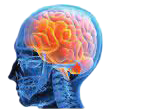7 Common Causes of Memory Loss
As a neuropsychologist, one of the most common concerns patients share with me is worry about memory lapses. That moment of walking into a room and forgetting why, or struggling to recall a familiar name during conversation, can trigger genuine anxiety. Many immediately fear these experiences signal the beginning of dementia or Alzheimer's disease.
What I want you to know is that memory fluctuations have many potential causes beyond serious cognitive disorders. Understanding these factors can not only ease your worries but also help you take practical steps to support your brain health.
1. Medication Effects on Your Thinking
Many common medications can temporarily affect memory and thinking as side effects. In my practice, I frequently see cognitive changes related to:
Anxiety medications and sleep aids (particularly benzodiazepines)
Some antidepressants, especially those with anticholinergic properties
Antihistamines for allergies or colds
Pain medications, particularly opioids
Blood pressure medications, including certain beta-blockers
Medications for bladder control or motion sickness
What's encouraging is that these effects are often reversible. If you notice memory changes after starting a new medication, this is worth discussing with your healthcare provider. Often, adjusting the dosage or switching to an alternative can make a significant difference in your cognitive clarity.
2. Metabolic Influences
Your brain requires a finely tuned metabolic environment to function optimally. Several common conditions can disrupt this balance:
Thyroid imbalances—particularly hypothyroidism—can slow thinking and affect memory
Diabetes and blood sugar fluctuations can impact how clearly your brain functions
Hormonal changes during menopause or andropause affect brain chemistry and memory processes
I've seen many patients experience noticeable cognitive improvements once these underlying conditions are properly managed. Your brain is remarkably resilient, and addressing these metabolic factors often restores cognitive clarity.
3. The Critical Role of Sleep
Few things affect memory and thinking more profoundly than the quality of your sleep. Your brain uses sleep time to sort and strengthen the day's memories—a process called consolidation. Common sleep disruptors include:
Sleep apnea, which reduces oxygen flow to your brain during rest
Insomnia, which prevents you from getting enough total sleep
Restless leg syndrome and periodic limb movements, which fragment sleep
Inconsistent sleep schedules that disrupt your natural sleep rhythms
Research shows that adults who consistently sleep less than six hours nightly have a significantly higher risk of developing cognitive problems over time. Prioritizing healthy sleep is one of the most powerful steps you can take for your brain health.
4. The Simple Matter of Hydration
Something as basic as not drinking enough water can noticeably affect your thinking. Your brain is approximately 75% water, and even mild dehydration can:
Temporarily reduce brain volume
Slow your thinking processes
Make concentration more difficult
Leave you feeling mentally foggy
I often suggest that patients struggling with afternoon mental fatigue first check their hydration status. Simply drinking water throughout the day can sometimes bring remarkable clarity to your thinking.
5. Nutrients and Brain Function
Your brain depends on specific nutrients to function optimally, and deficiencies can directly impact memory. The most well-documented connection is with Vitamin B12:
Low B12 levels can cause confusion, memory problems, and cognitive slowing
B12 absorption becomes less efficient as we age, making deficiencies more common
Certain medications (like acid reducers) and dietary patterns can increase deficiency risk
Other important brain nutrients include folate, Vitamin D, and omega-3 fatty acids. A simple blood test can identify deficiencies, and proper supplementation often brings noticeable cognitive improvements within weeks or months.
6. Memory and Emotions
Our emotional state profoundly affects how well our memory systems function. Both depression and anxiety can:
Reduce your ability to focus, making memory formation difficult
Consume mental bandwidth needed for effective information processing
Create a cycle where memory concerns increase anxiety, further impairing memory
In my practice, I've observed that treating underlying depression or anxiety often results in significant memory improvements. This happens because emotional distress takes up cognitive resources that your brain needs for effective memory function.
7. Chronic Health Conditions
Several ongoing health conditions can create cognitive symptoms that mimic memory disorders:
Chronic pain conditions that divide your attention and mental resources
Fibromyalgia and chronic fatigue syndrome, which affect the energy available for cognitive tasks
Post-treatment effects from cancer therapies ("chemo brain")
Long COVID symptoms, which can include persistent "brain fog"
These conditions don't typically cause permanent memory damage, but they can make cognitive tasks more challenging while they're active. Managing the underlying condition often helps restore cognitive clarity.
About the Author: Dr. Susan Borgaro is a Clinical Neuropsychologist specializing in memory assessment and cognitive enhancement strategies. With over 25 years of experience working with patients across the lifespan, Dr. Borgaro brings both clinical expertise and practical insights to help people optimize their cognitive functioning. www.nasarizona.com

